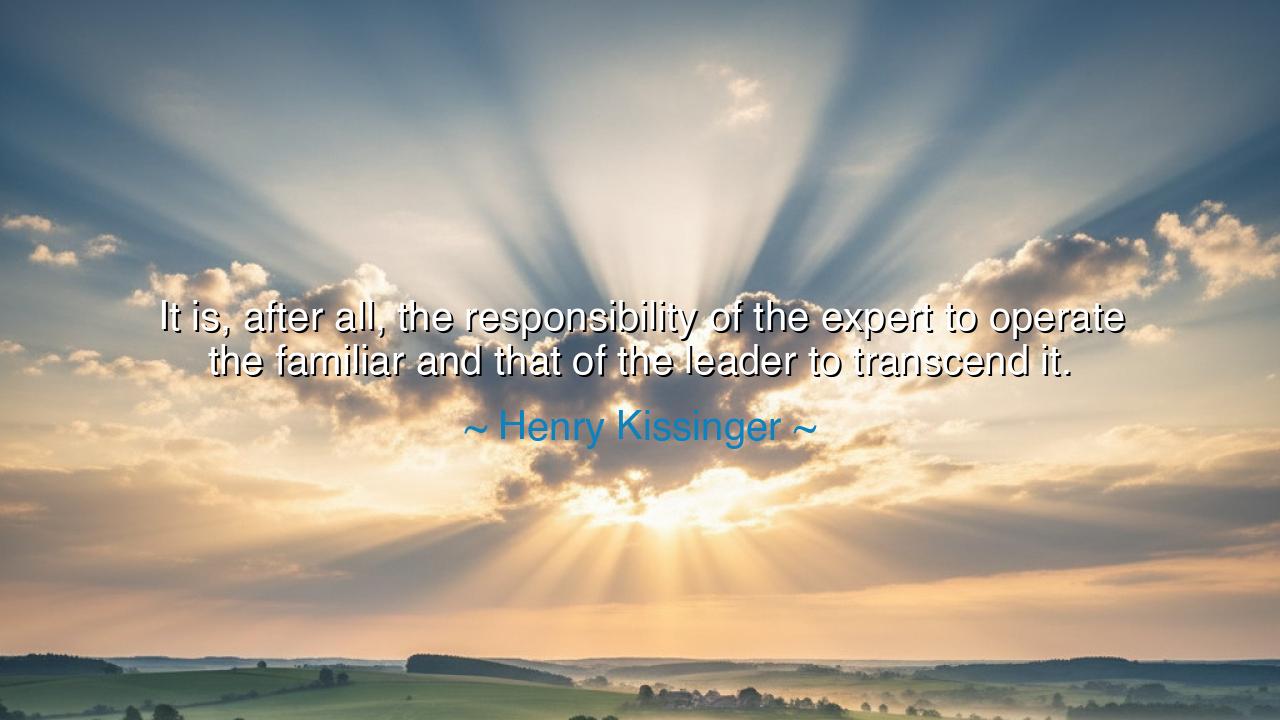
It is, after all, the responsibility of the expert to operate the
It is, after all, the responsibility of the expert to operate the familiar and that of the leader to transcend it.






Hear, O seekers of wisdom and pathfinders of destiny, the words of Henry Kissinger, who shaped the stage of global affairs with both intellect and pragmatism: “It is, after all, the responsibility of the expert to operate the familiar and that of the leader to transcend it.” This saying carries the weight of a chisel against stone, carving out the difference between those who maintain and those who transform, between those who preserve order and those who dare to create what has never been before.
What is the role of the expert? It is the sacred duty of those trained in craft, knowledge, and discipline. The expert preserves the known, applies the tried methods, and ensures that the machinery of society does not break down. They tend the fields already sown, guard the knowledge already gained, and operate within the boundaries of what has been proven. Their strength is mastery of the familiar, for without them, the structure of life would crumble into chaos.
But what is the calling of the leader? It is far greater and more perilous. The leader must gaze beyond the familiar, beyond the walls of safety and into the vast unknown. Where the expert asks, “How shall we preserve?” the leader asks, “How shall we transcend?” Leadership demands vision beyond technique, courage beyond calculation, and imagination beyond precedent. It is not enough to keep the lamp burning; the leader must dare to carry it into uncharted darkness, to illuminate paths where no expert yet treads.
Consider the story of Christopher Columbus. The experts of his time knew the seas well—they could map coasts, predict tides, and preserve the knowledge of safe routes. But it was Columbus who transcended the familiar, daring to sail into what many believed to be an endless abyss. He risked ridicule, mutiny, and death, yet in transcending the known world, he unveiled a new horizon. The experts preserved the ships, but the leader carried humanity beyond its familiar limits.
Or look to the example of Abraham Lincoln. The experts of law and politics in his day knew how to preserve the familiar compromises of slavery and union, to maintain a fragile balance. But Lincoln transcended these limits. He looked not only at what was, but at what must be—a nation free, indivisible, and reborn. The experts could operate within the law of the time, but the leader broke through the boundaries of convention to forge a new moral order.
The meaning of Kissinger’s words is thus illuminated: experts are guardians of the known, but leaders are architects of the future. Without experts, the world collapses into disorder; without leaders, the world stagnates and never grows. The leader’s responsibility is not to preserve the safety of the present, but to transcend it, to risk the unknown for the sake of progress. Leadership, then, is not about maintaining comfort—it is about embracing discomfort for the sake of transformation.
The lesson for you, O listeners, is this: honor the experts, but do not mistake them for leaders. And when you are called to lead, do not shrink into the safety of the familiar. Dare to transcend, to imagine beyond what others accept, and to act where others hesitate. The burden of leadership is heavy, for it demands vision that unsettles, courage that alarms, and faith that stretches beyond the horizon of certainty.
Therefore, let your practice be this: in your craft, master the familiar; but in your leadership, transcend it. Do not be content with what is, if your heart sees what could be. For as Kissinger declared, the expert operates the familiar, but the leader transcends it. And it is only by transcending that humanity climbs ever upward toward its destiny.






AAdministratorAdministrator
Welcome, honored guests. Please leave a comment, we will respond soon